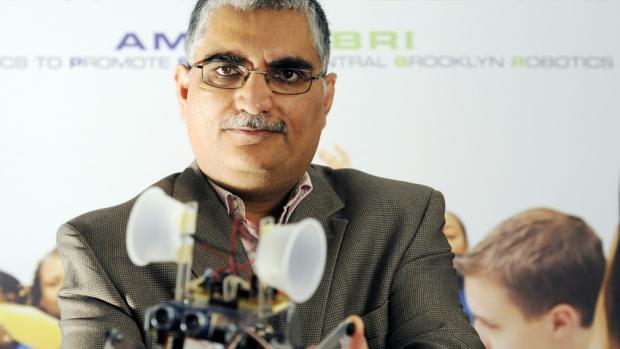Professor of Mechanical Engineering Vikram Kapila Is Honored for His Contributions to NYU

When Vikram Kapila, a professor of mechanical engineering, received the Polytechnic School of Engineering’s 2014 Jacobs Excellence in Education Award, he was characteristically modest, asserting that the award honors not only the recipients themselves but the entire community of scholars at the school. “It is a privilege for me to be a faculty member here,” he said at that time. “It is a blessing to have wonderful colleagues and passionate students with inquisitive minds. As they offer new perspectives and help discover novel solutions to engineering problems, I also learn.”
Now Kapila—who was also the recipient of Polytechnic’s 2003 Distinguished Teacher Award and the Jacobs Excellence in Education Awards in 2002, 2008, and 2011—has been recognized on a broader, university-wide scale; he is one of the 2014-15 winners of the NYU Distinguished Teaching Award, which was established to recognize NYU faculty members who have contributed significantly to the intellectual life of the entire university over a sustained period of time. Recipients must have a record of outstanding teaching effectiveness both within and outside the classroom; the ability to inspire, promote, and sustain the intellectual development of their students; an innovative, intellectually rigorous, creative, and engaging pedagogical approach; and demonstrated contributions to developing or enhancing curricula in their field. Given those criteria, Kapila was a natural choice.
Many of his most noteworthy contributions have centered on K-12 STEM education; thanks in large part to his efforts, the School of Engineering is widely considered a major force in that area, in New York City and beyond. He currently directs K-12 education, training, mentoring, and outreach programs that enrich the STEM education of more than 1,100 students each year. Among those programs is SMARTER (Science and Mechatronics Aided Research for Teachers with an Entrepreneurship expeRience), which brings a dozen teachers to Brooklyn over the summer to receive mentoring from professors, engage in entrepreneurship activities, and conduct inquiry-based, hands-on, engineering research. He recently won a $2.6 million National Science Foundation DR K-12 grant for a project that will help middle school science and math teachers use robotics as their curriculum focus. (The modern tools and techniques of engineering must be incorporated into K-12 science and math teaching, he says, if students are to be transformed from mere consumers of technology to become creators of novel technological products.)
Ask School of Engineering students about Kapila, and a significant percentage will think of robotics first. In addition to creating and teaching impactful courses such as Mechatronics and Advanced Mechatronics, he is the primary developer of the Mechatronics Lab complex. Students in his mechatronics lab have developed mobile user interfaces to permit natural and intuitive human-robot interaction. Moreover, they have built wheeled robots, bipedal robots, and a host of others, including, most famously, CAESAR, a humanoid robot built with off the shelf and 3D printed parts and programmed using open-source software with the intent of helping people with disabilities.
The editor of three books and the author of 55 journal articles, 114 conference papers, and seven book chapters, many of which have included his students as co-authors, Kapila has taught at the School of Engineering since 1996. He is thankful to the Polytechnic and NYU community—the faculty, administrators, and students—for allowing him to explore new directions in teaching, learning, and knowledge creation, specifically in the development of interdisciplinary education, training, and outreach programs in mechatronics, robotics, and advanced control technologies. With his 20-year anniversary fast approaching, he feels particularly gratified by this latest laurel. “Since the merger between NYU and Poly, we as engineers have enjoyed the benefits of being part of a world-class research university,” he says. “In bestowing the Distinguished Teaching Award on me, the university is acknowledging not just my contributions, but the importance of engineering to the NYU community.” Having developed some early collaborations with colleagues from NYU Steinhardt and NYU School of Medicine, he is confident that such cross-disciplinary interactions will not only benefit research and scholarly work but also teaching and learning.

